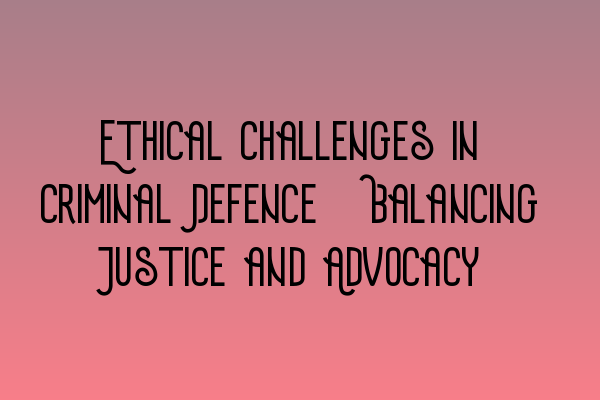Ethical Challenges in Criminal Defence: Balancing Justice and Advocacy
As criminal defence lawyers, we are tasked with the challenging responsibility of ensuring that our clients receive a fair trial while upholding the principles of justice. However, this delicate balance often presents us with ethical challenges that require careful navigation. In this article, we will explore the ethical dilemmas faced by criminal defence lawyers and the importance of finding a harmonious equilibrium between justice and advocacy.
The Duty of Zealous Advocacy
One of the fundamental pillars of criminal defence is the duty of zealous advocacy. It is our obligation to fiercely advocate for our clients, ensuring that their rights are protected and that they receive the best possible outcome. However, this duty can sometimes clash with our ethical obligations as legal professionals.
In the pursuit of zealous advocacy, we must always remember the importance of honesty and integrity. While it is essential to present our client’s case in the best light, we must not cross the line into unethical conduct, such as presenting false evidence or knowingly misleading the court. Upholding our duty to our clients should not come at the expense of the integrity of the legal system.
Conflict of Interest
Another ethical challenge that criminal defence lawyers face is navigating potential conflicts of interest. We must ensure that our personal interests or relationships do not compromise our duty to provide diligent representation to our clients. This includes situations where we may have conflicting loyalties or obligations to other individuals or organizations.
It is crucial for lawyers to identify and disclose any potential conflicts of interest to their clients and the court. By maintaining transparency and addressing conflicts appropriately, we can preserve the trust of our clients and the integrity of the legal profession.
The Importance of Confidentiality
Confidentiality is a cornerstone of the lawyer-client relationship. Clients must be able to trust that the information they share with us remains private and protected. However, balancing this duty of confidentiality with our obligations to the court and the administration of justice can present ethical challenges.
In some situations, we may learn information from our clients that could potentially harm others or pose a risk to public safety. In these cases, we must carefully consider our ethical and legal obligations to disclose or report such information. Striking the right balance between maintaining client confidences and preventing harm is a complex task that requires careful judgment.
Embracing Professional Development and Ethics
As criminal defence lawyers, it is essential to continually enhance our knowledge and skills in the field of criminal law. This includes staying informed about updates in UK criminal laws, attending workshops and seminars on criminal practice, and actively engaging in discussions within SQE Criminal Law study groups.
Workshops and Seminars on Criminal Practice: Expanding Your Expertise provide valuable opportunities to learn from experienced practitioners, engage in thought-provoking discussions, and address ethical challenges that arise in criminal defence.
By embracing professional development, we can enhance our understanding of the ethical dimensions of criminal defence and develop strategies to overcome the challenges they present.
Conclusion
Being a criminal defence lawyer comes with its fair share of ethical challenges. Balancing the duty of zealous advocacy with the principles of justice is a delicate task that requires careful consideration. By staying informed, embracing professional development opportunities, and maintaining integrity, we can navigate these challenges and fulfill our duty to our clients and the legal profession.
Further reading:
